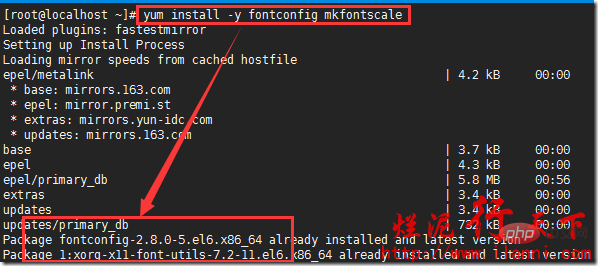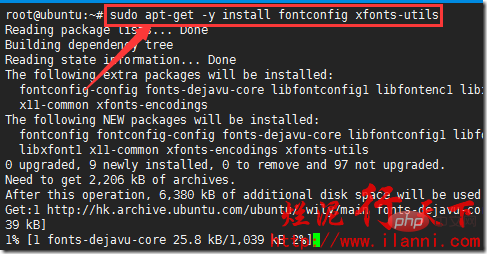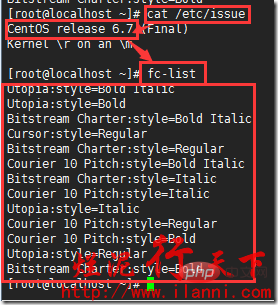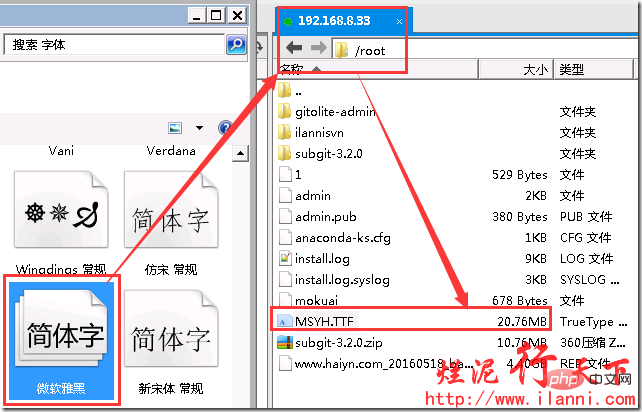How to install fonts in linux
Method: 1. Use the "cp specify font file /usr/share/fonts/" command to copy the font file to the specified directory; 2. Use "cd /usr/share/fonts/ mkfontscale mkfontdir fc -cache" command to install the font.

#The operating environment of this tutorial: linux7.3 system, Dell G3 computer.
How to install fonts in Linux
1. Check the system fonts
Before starting the installation, we first check the fonts that have been installed in the system.
To view the fonts installed in the system, we can use the fc-list command to view. If this command does not exist in the system, we need to install the relevant software packages first.
On centos, use the following command to install:
yum install -y fontconfig mkfontscale


 ##The above picture shows the fonts installed by default on centos6.
##The above picture shows the fonts installed by default on centos6.
 The picture above shows the fonts installed by default on ubuntu.
The picture above shows the fonts installed by default on ubuntu.
If you want to view the Chinese fonts installed in the system, we can use the following command:
fc-list :lang=zh
 Through the picture above, we can see that centos6 and ubuntu do not have Chinese fonts installed by default.
Through the picture above, we can see that centos6 and ubuntu do not have Chinese fonts installed by default.
Through the first chapter, we know that there is no Microsoft Yahei font in the current system. We now need to upload the MSYH.TTF (Microsoft Yahei font file) file to the Linux server. As follows:
C:\Windows\Fonts All files in this directory can be packaged and uploaded, and they can still be used in the following way (tested)

在centos上和ubuntu上安装字体方法都是一样的,我们只需要进行相关的操作即可。
把MSYH.TTF复制到/usr/share/fonts/目录下,使用如下命令:
cd /root/
cp MSYH.TTF /usr/share/fonts/
然后建立字体索引信息,更新字体缓存,使用如下命令: cd /usr/share/fonts/ mkfontscale mkfontdir fc-cache

至此,字体已经安装完毕。 现在我们再来查看微软雅黑字体,是否安装成功,使用如下命令: fc-list :lang=zh

 Through the above picture, We can clearly see that the Microsoft Yahei font has been successfully installed.
Through the above picture, We can clearly see that the Microsoft Yahei font has been successfully installed.
Related recommendations: "
Linux Video TutorialThe above is the detailed content of How to install fonts in linux. For more information, please follow other related articles on the PHP Chinese website!

Hot AI Tools

Undresser.AI Undress
AI-powered app for creating realistic nude photos

AI Clothes Remover
Online AI tool for removing clothes from photos.

Undress AI Tool
Undress images for free

Clothoff.io
AI clothes remover

Video Face Swap
Swap faces in any video effortlessly with our completely free AI face swap tool!

Hot Article

Hot Tools

Notepad++7.3.1
Easy-to-use and free code editor

SublimeText3 Chinese version
Chinese version, very easy to use

Zend Studio 13.0.1
Powerful PHP integrated development environment

Dreamweaver CS6
Visual web development tools

SublimeText3 Mac version
God-level code editing software (SublimeText3)

Hot Topics
 What computer configuration is required for vscode
Apr 15, 2025 pm 09:48 PM
What computer configuration is required for vscode
Apr 15, 2025 pm 09:48 PM
VS Code system requirements: Operating system: Windows 10 and above, macOS 10.12 and above, Linux distribution processor: minimum 1.6 GHz, recommended 2.0 GHz and above memory: minimum 512 MB, recommended 4 GB and above storage space: minimum 250 MB, recommended 1 GB and above other requirements: stable network connection, Xorg/Wayland (Linux)
 vscode cannot install extension
Apr 15, 2025 pm 07:18 PM
vscode cannot install extension
Apr 15, 2025 pm 07:18 PM
The reasons for the installation of VS Code extensions may be: network instability, insufficient permissions, system compatibility issues, VS Code version is too old, antivirus software or firewall interference. By checking network connections, permissions, log files, updating VS Code, disabling security software, and restarting VS Code or computers, you can gradually troubleshoot and resolve issues.
 How to run java code in notepad
Apr 16, 2025 pm 07:39 PM
How to run java code in notepad
Apr 16, 2025 pm 07:39 PM
Although Notepad cannot run Java code directly, it can be achieved by using other tools: using the command line compiler (javac) to generate a bytecode file (filename.class). Use the Java interpreter (java) to interpret bytecode, execute the code, and output the result.
 What is vscode What is vscode for?
Apr 15, 2025 pm 06:45 PM
What is vscode What is vscode for?
Apr 15, 2025 pm 06:45 PM
VS Code is the full name Visual Studio Code, which is a free and open source cross-platform code editor and development environment developed by Microsoft. It supports a wide range of programming languages and provides syntax highlighting, code automatic completion, code snippets and smart prompts to improve development efficiency. Through a rich extension ecosystem, users can add extensions to specific needs and languages, such as debuggers, code formatting tools, and Git integrations. VS Code also includes an intuitive debugger that helps quickly find and resolve bugs in your code.
 Can vscode be used for mac
Apr 15, 2025 pm 07:36 PM
Can vscode be used for mac
Apr 15, 2025 pm 07:36 PM
VS Code is available on Mac. It has powerful extensions, Git integration, terminal and debugger, and also offers a wealth of setup options. However, for particularly large projects or highly professional development, VS Code may have performance or functional limitations.
 How to use VSCode
Apr 15, 2025 pm 11:21 PM
How to use VSCode
Apr 15, 2025 pm 11:21 PM
Visual Studio Code (VSCode) is a cross-platform, open source and free code editor developed by Microsoft. It is known for its lightweight, scalability and support for a wide range of programming languages. To install VSCode, please visit the official website to download and run the installer. When using VSCode, you can create new projects, edit code, debug code, navigate projects, expand VSCode, and manage settings. VSCode is available for Windows, macOS, and Linux, supports multiple programming languages and provides various extensions through Marketplace. Its advantages include lightweight, scalability, extensive language support, rich features and version
 Linux Architecture: Unveiling the 5 Basic Components
Apr 20, 2025 am 12:04 AM
Linux Architecture: Unveiling the 5 Basic Components
Apr 20, 2025 am 12:04 AM
The five basic components of the Linux system are: 1. Kernel, 2. System library, 3. System utilities, 4. Graphical user interface, 5. Applications. The kernel manages hardware resources, the system library provides precompiled functions, system utilities are used for system management, the GUI provides visual interaction, and applications use these components to implement functions.
 What is the main purpose of Linux?
Apr 16, 2025 am 12:19 AM
What is the main purpose of Linux?
Apr 16, 2025 am 12:19 AM
The main uses of Linux include: 1. Server operating system, 2. Embedded system, 3. Desktop operating system, 4. Development and testing environment. Linux excels in these areas, providing stability, security and efficient development tools.






